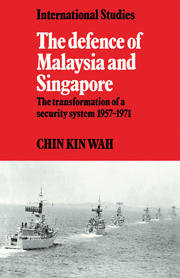Book contents
- Frontmatter
- Contents
- Preface
- Acknowledgements
- List of abbreviations
- Note on currency units
- 1 Introduction
- 2 Pre-treaty defence relations
- 3 Decolonisation and the institution of the defence agreement
- 4 The extension of AMDA
- 5 The external testing of AMDA
- 6 Towards a closing of ranks
- 7 The fractured axis
- 8 Britain weighs anchor
- 9 From AMDA to the five-power defence system
- 10 Conclusions
- Postscript on five-power arrangements
- Notes
- Bibliography
- Index
5 - The external testing of AMDA
Published online by Cambridge University Press: 07 October 2011
- Frontmatter
- Contents
- Preface
- Acknowledgements
- List of abbreviations
- Note on currency units
- 1 Introduction
- 2 Pre-treaty defence relations
- 3 Decolonisation and the institution of the defence agreement
- 4 The extension of AMDA
- 5 The external testing of AMDA
- 6 Towards a closing of ranks
- 7 The fractured axis
- 8 Britain weighs anchor
- 9 From AMDA to the five-power defence system
- 10 Conclusions
- Postscript on five-power arrangements
- Notes
- Bibliography
- Index
Summary
Among other things, the Malaysia proposal involved additional defence burdens for Kuala Lumpur. Rapid expansion of local military forces and Malayanisation of the senior army posts were necessary. A three-year blueprint for the defence of the Malaysian region (announced in September 1962) envisaged a doubling of the air force's manpower, a near doubling of that of the navy and an increase by a third of that of the army. The expansion was concentrated on peninsula-based forces. There were no immediate plans to station Malayan units in the Borneo territories, nor was a third battalion suggested for Singapore. Indeed, this military expansion, compared to the doubling of territorial responsibility, was modest. The M$90 million defence expenditure for 1962 represented a mere 9% of Malaya's expenditure on current account. Furthermore, the projected expansion depended heavily on anticipated external financial assistance.
The establishment and financing of a Malaysian force was discussed inter alia, in London in July 1962, when it was agreed that the new Federation would be inaugurated on 31 August 1963. However, discussions on the financing of Malaya's defence were inconclusive and further talks were scheduled for September. Apparently Britain fell short of Malaya's expectations and, on returning to Kuala Lumpur, the Tunku indicated that contributions from Australia and New Zealand would be welcomed. Rapid development of the Malayan armed forces within the very short period before 31 August 1963 proved to be a major problem.
- Type
- Chapter
- Information
- The Defence of Malaysia and SingaporeThe Transformation of a Security System 1957–1971, pp. 58 - 81Publisher: Cambridge University PressPrint publication year: 1982

